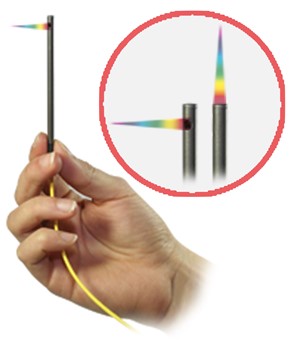Since its formation 45 years ago, Micro-Epsilon has pioneered the development of more innovative, non-contact displacement measurement sensors.
The future will see more compact, smarter sensors with integrated electronics that offer new features and increased functionality, says Chris Jones, Managing Director at Micro-Epsilon UK.
Displacement can be measured in various ways by using a number of different physical measuring principles. Some years ago, displacement sensors were still relatively large in their housing design, with separate, discrete electronics. However, new technologies and production systems are now enabling miniature sensors to be produced with integrated electronics. A pioneer in this field is Micro-Epsilon.
Established in Hanover, Germany in 1968, Micro-Epsilon was originally a supplier of strain gauges, the start of the company’s displacement measurement product range. In the mid-1970s, it was already recognised that the future for Micro-Epsilon was in non-contact displacement measurement technology.
In 1982, Micro-Epsilon developed the S05, the world’s first miniature eddy current displacement sensor. This was followed by even further developments when, in 1998, Micro-Epsilon launched the U05 (08), at that time, the world’s smallest eddy current displacement sensor. This sensor was the result of a further reduction in size of the U05 standard sensor, which had been a successful reliable product over many years. This trend towards miniaturisation has been a critical success factor for Micro-Epsilon and more importantly its customers to this day.
The 1990s saw the constant progression of digital technologies, which made access to new electronics and optical components possible. In 1992, Micro-Epsilon launched the world’s first fully digital optical sensor, the optoNCDT 2000. Rather than using PSD lines for acquiring measured values, innovative CCD elements were used, which achieved new levels of precision that had never been seen before.
 The miniaturisation of sensors: the 4mm diameter IFS 2402 confocal sensor.
The miniaturisation of sensors: the 4mm diameter IFS 2402 confocal sensor.
In 1994, Micro-Epsilon developed the LIP inductive sensor, a major innovation at the time. The compact, flexible design enabled the company to manufacture cost-effective, customer-specific sensors for OEM displacement measurement applications.
From the turn of the Millennium, Micro-Epsilon has continued to develop its range of confocal measurement sensors. In 2006, for example, the company launched a confocal miniature sensor with an outer diameter of just 4mm, another world first.
Current trends in displacement measurement technology indicate that smaller, more intelligent sensors with integrated electronics are now required. In mechanical engineering, the requirement for extremely compact sensors is always an important factor, especially if installation space is restricted or if the sensor needs to be lightweight. This is also the case in terms of integration of more electronics and intelligence in the sensor. This means that sensors are more frequently required to perform the signal conditioning directly in the sensor, therefore reducing component count, whilst offering faster measuring speeds.
In the last five years, Micro-Epsilon has continued to raise the bar in terms of non-contact displacement measurement. For example, the company’s next-generation of eddy current sensors use a patented embedded coil technology (ECT), which overcomes the previous limitations of discrete coil windings. The eddyECT sensor coil utilises new inorganic materials to embed the coil, which enables hermetically-sealed, ultra-compact designs. This provides almost unlimited scope in terms of the external design and geometrical shape of the sensors.
The sensors also offer extreme mechanical robustness, resulting in longer service intervals and higher temperature stability. The complete circuit electronics can be integrated into the sensor, providing an even more compact measurement solution. The sensors are also suitable for harsh operating environments, including high vibration, impact shocks and high operating temperatures (up to 650°C). Sensors have been produced with extremely low thermal drift and with temperature errors of less than 20 parts per million per degree Kelvin (20 ppm/K).
By integrating smart electronics in the sensor itself, laser triangulation sensors are a great example of how much smaller sensor systems are becoming. Most conventional sensors require a separate electronics unit as well as the sensor itself. The latest sensor designs have a very small housing in which the complete electronics are integrated without sacrificing sensor performance. Measuring ranges vary between 5mm and 2m.
Extremely high resolutions are possible when using confocal chromatic measurement technology. Resolutions in the nanometre range are typically achieved. Confocal sensors have a very small measuring spot that enables measurements on particularly small objects. Therefore, even the finest scratches on a surface can be measured reliably. The beam path of the sensor is compact and concentric and so measurements inside bore holes or test tubes are possible. Thickness measurement of transparent films, boards or layers is also possible.
In industrial automation, there is a growing trend towards replacing existing first generation fieldbuses with industrial Ethernet. Manufacturing processes are becoming higher speed and more automated and so these industrial networks require sensors and measurement systems that support these faster, dynamic processes. As a result, Micro-Epsilon is integrating real time Ethernet technology into many of its laser displacement sensors and controllers and is developing sensors and controllers that cater for these requirements.
EtherCAT is rapidly establishing itself within the market as a communications standard (protocol) that can offer true real time capabilities in automation technology. In line with this, Micro-Epsilon has also developed sensors and controllers with EtherCAT capability, enabling them to be smoothly integrated into existing control and automation networks.
With more than 45 years’ experience in the industry, Micro-Epsilon isn’t just a sensor manufacturer. The company is highly innovative and understands the importance of providing complete solutions and support services for its customers. The firm is renowned for its expertise in consulting, development and application of industrial sensors to complex, customer-specific solutions for measurement, inspection and automation. The focus is on selling technical advantage to its customers.